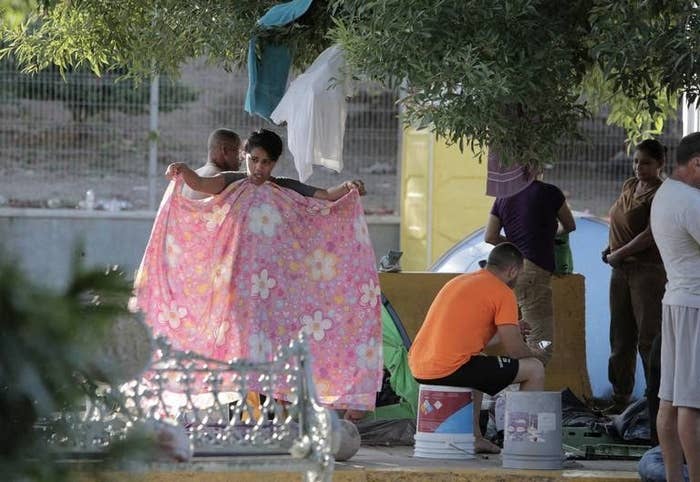
On the eve of the presidential election, thousands of Cubans stuck in dangerous Mexican border cities have a message for their US compatriots: Remember we're still stranded here.
The Trump administration's Migrant Protection Protocols (MPP) has made more than 67,000 immigrants and asylum-seekers wait in Mexico while their cases are completed in the US. Of those, according to data from the Transactional Records Access Clearinghouse from Syracuse University, 10,027 are from Cuba.
Dailín, a 26-year-old doctor living in the Mexican border city of Ciudad Juárez, is one of them. In the time since she was sent back across the border by the US, she has been attacked twice, the second time shortly after she found out she was pregnant.
"We're very vulnerable here," Dailín told BuzzFeed News. "We have no human rights here and the Mexican government hasn't offered us any protection."
She can't vote, but that hasn't stopped her from reaching out to her family in the US and encouraging them to vote for former vice president Joe Biden because he's promised to end MPP within the first 100 days of taking office.
On Feb. 28, Dailín was walking to work when she noticed she was being followed by a man. She tried to outrun him, but wasn't fast enough. Her attacker, Dailín said, grabbed her and tried to drag her into an abandoned house. Dailín punched and kicked him until she could escape his grasp, but in the struggle the man punched her in the stomach. Dailín and her husband filed a police report, but Mexican police told them there wasn't much else to do.
Dailín's experience is not unique. A Human Rights First database has tracked more than 1,100 public reports of rape, torture, kidnapping, and other violence against immigrants sent back to Mexico under MPP.
It isn't hard to convince her family to vote for Biden, Dailín said, because they hear directly from her about what she has experienced since being sent back to Mexico. It is much harder to reach and convince voters who don't have a direct connection to someone in the MPP program, Dailín said.
"They think they are superior to Cubans at the border. On Facebook they post comments saying we are economic migrants and not fleeing political persecution, that we're in favor of the regime," Dailín said. "That is not true, no one endures what we're enduring if we could live in Cuba."
In a Facebook post, Dailín warned Cuban Americans to be careful when voting for Trump considering his anti-immigrant policies and hoping he doesn't start taking away people's US residency.
"When you see your neighbor's beard burn, soak yours," Dailín wrote. "I want to see how many will be screaming Trump if he does that."
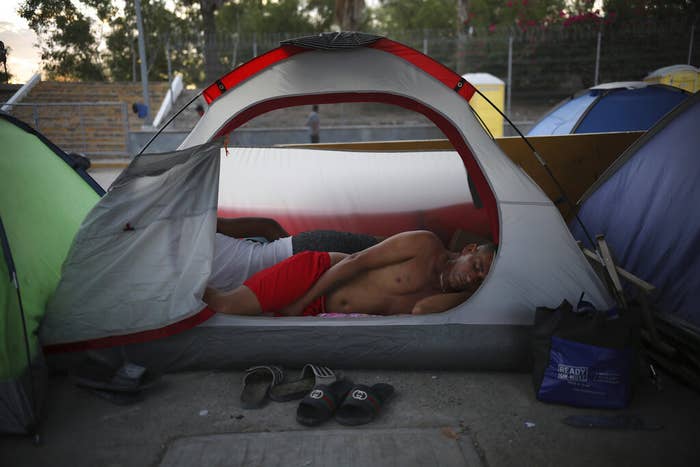
Cuban Americans tend to lean Republican, but they are not a monolithic voting group and have diverse political beliefs.
Despite being a small percentage of the US population, Cuban American voters have received a lot of attention in presidential elections because of their presence in Florida, a swing state.
Florida International University's 2020 Cuba poll found that 53% of Cuban American registered voters were Republican, and the GOP is replenishing itself with the support of new arrivals. Among Cubans who arrived between 1995 and 2009, 49% were Republicans, a lower percentage than most recent arrivals from 2010 to 2015, of which 76% support the GOP.
When it comes to immigration, the poll found that 64% of Cuban Americans support the way President Trump has handled the issue of immigration. Those not born in Cuba and registered Democrats were the only two categories of respondents who significantly opposed Trump's handling of immigration, at 50% and 78% opposition, respectively.
The Cuban immigrant experience is a unique one in the US.
Previously, Cuban immigrants benefited from the “wet-foot, dry-foot” policy, which since 1995 allowed Cubans who touched US soil without a visa to be admitted into the country with a path to citizenship. Former president Barack Obama ended the preferential treatment on Jan. 12, 2017, in the final days of his administration in his efforts to reestablish relations with Cuba.
Now Cubans who arrive at the US border are treated just like any other immigrant; having to wait months and sometimes more than a year on the Mexican side of the border because of the MPP policy is an experience foreign to their compatriots already in the US.
MPP, also known as Remain in Mexico, was announced by the Department of Homeland Security in 2019. It was launched in Tijuana with the return of a single man and then expanded across the border to most immigrants, though there were categories of exemptions.
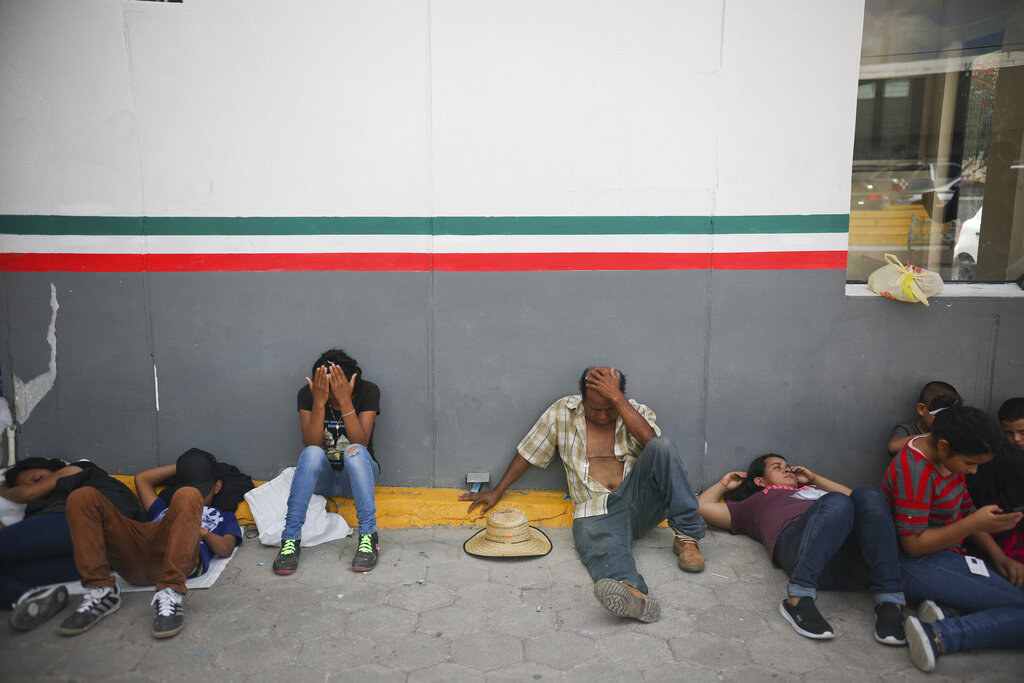
Yamil Ricardo Velez, an assistant professor of political science at Columbia University, believes part of the reason the Cuban American community doesn't know about a policy that has forced thousands of their people to wait in Mexico is due in part to a lack of news coverage of its impact, especially on networks like Univision.
Plus, Velez said, if the baseline among Cuban Republicans is to support Trump, including his handling of immigration policies, people are going to come up with justifications for their approval.
"Even if this is an objectively horrible policy and people are suffering, sadly, I think people's faith in Trump ... is gonna offset that," Velez told BuzzFeed News. "They're gonna to try to reconcile whatever is going on at the border and they're not gonna attribute it to Trump."
It's going to be very difficult to convince a Trump supporter to vote for Biden, Velez added. What is more likely to happen, he said, is Cuban Americans who may not have been planning to vote will learn about Remain in Mexico and will now cast their ballot because of it.
In general, advocates in the US have a hard time explaining Remain in Mexico because it is more technical than some of the other policies the Trump administration has rolled out — and immigrants are out of sight, out of mind on the south side of the border.
"How many people actually have a direct connection to those folks at the border? Not many," Velez said.
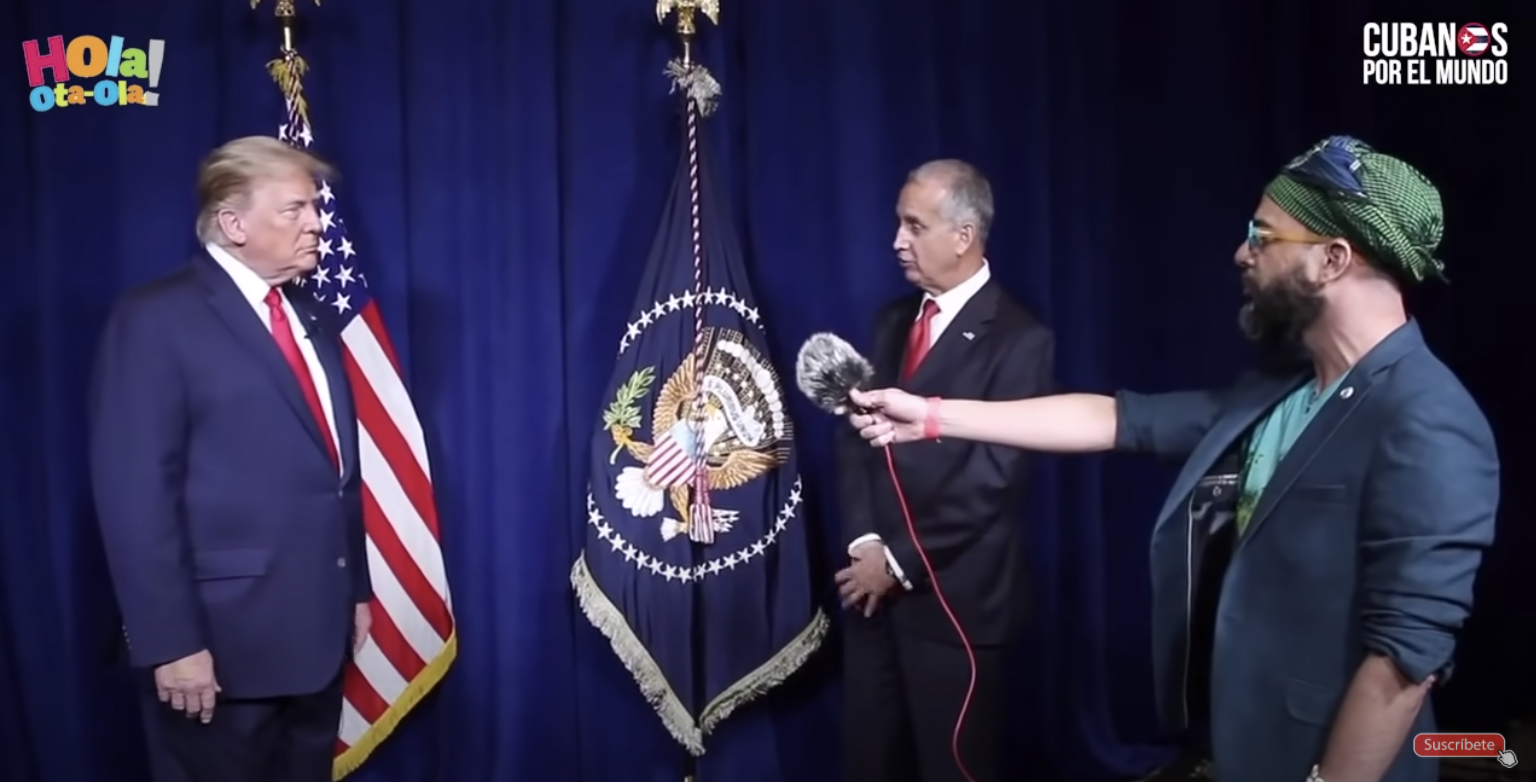
Alex Otaola, a Cuban immigrant and influencer who hosts a popular live daily YouTube show, has become a prominent voice for Cuban Republicans who support Trump and was recently awarded an interview with the president.
In May, during one of his live Facebook shows, viewers jumped into the comments section and wrote "SOS Frontera," or "SOS Border," in an attempt to get him to speak out against MPP and the Cubans stranded at the border. The social media campaign was launched by another Cuban influencer, Erich Concepcion.
Concepcion said Cuban immigrants in the US believe Trump will liberate Cuba from the Castro regime, but that's a pipe dream.
"They support him and leave all the Cubans stranded at the border," Concepcion told BuzzFeed News. "The Cuban is a migrant who fights against himself."
When the Trump administration launched MPP, it promised that returned immigrants would receive protection while they waited in Mexico for their court dates, Concepcion said. But how can immigrants and asylum-seekers be safe in northern Mexico along the border, an area controlled by cartels where they're targeted for extortion? he asked.
"They've been forgotten, killed, kidnapped, and no one seems to care,” Concepcion told BuzzFeed News.
Otaola said his program will not be used for this campaign in part because Cuban immigrants should be processed by current policies, even if it means waiting in Mexico.
"They're advocating for Biden to come to power because they believe that's how they will be able to enter the US," Otaola said.
Otaola also doesn’t believe all the Cubans at the southern border are fleeing political persecution back home.
"They never took to the streets to protest the system, at least not a majority of them, because we would've found out," Otaola said.
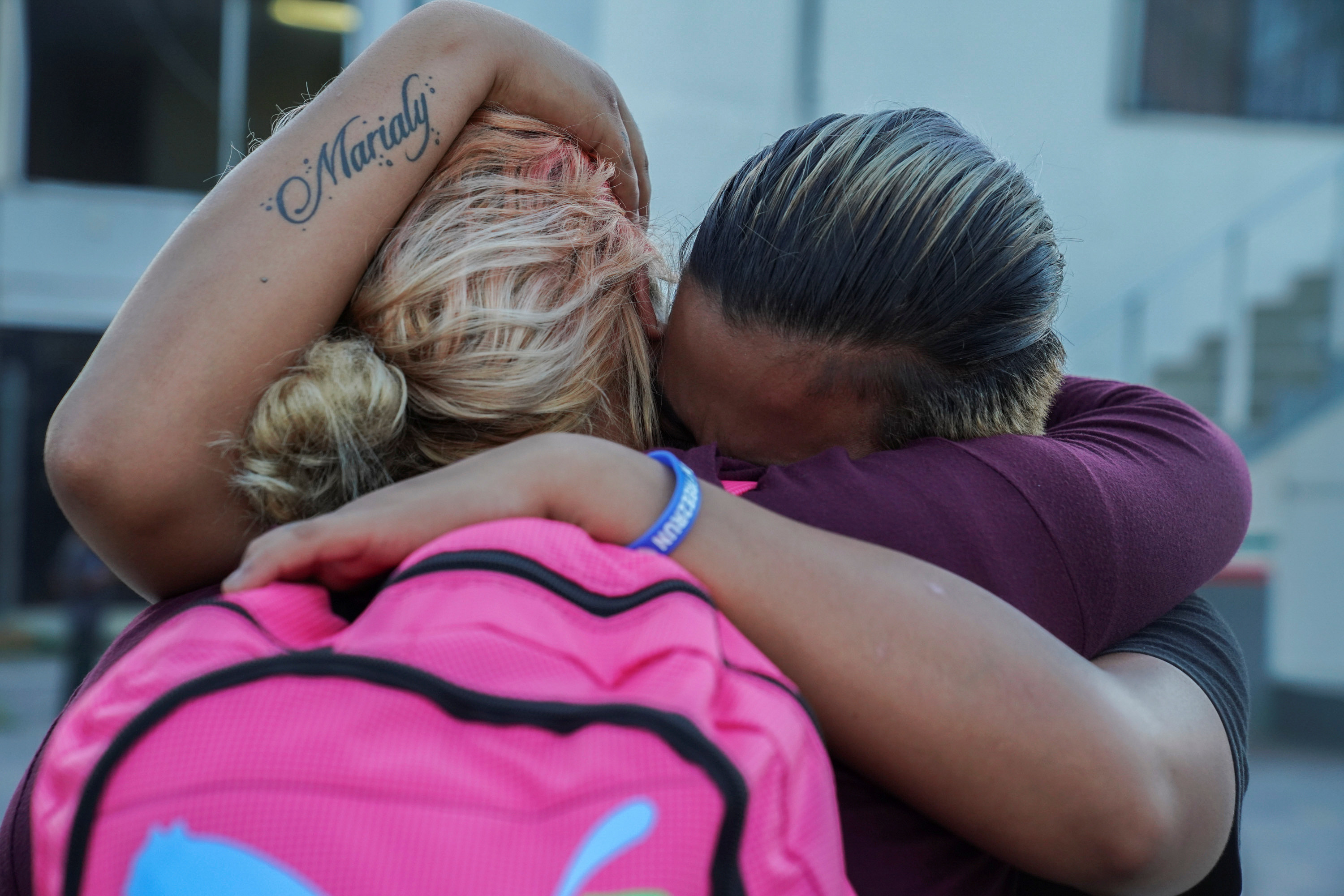
Ray Rodriguez, a Cuban asylum-seeker previously in MPP who won his immigration case, took issue with Otaola's comments about them not fleeing political persecution.
"There's this notion that people who have come to the border don't deserve American asylum because they were not dissidents in Cuba, they did not fight for the freedom of Cuba," Rodriguez said.
But you don't need to be out protesting against the government to be persecuted by the Cuban government, Rodriguez said. Voicing his disagreement with the Cuban government at his job as a university English teacher resulted in him being fired and eventually arrested and mistreated by police. Rodriguez said he was also harassed for being gay.
"But my dissent was never to the point where I decided to just grab a sign and go to the head of the government and start yelling," he said.
Still, an immigration judge ruled that Rodriguez deserved asylum, a rare victory for those in MPP.
"According to the law, I qualify for this. It doesn't say I have to go in front of the government and start yelling every day until they beat me to death and then I sneak out of the country in a boat," Rodriguez said.
Evian, a Cuban immigrant living in Ciudad Juarez, said he's gotten into arguments with friends in the US when he tells them to vote for Biden. The 35-year-old, who asked not to be identified by his full name fearing retaliation if he's deported to Cuba, said his friends don't understand how he can support Biden if Obama was the one who ended the “wet-foot, dry-foot” policy.
Even after Obama ended that policy, Evian told them, Cubans were still allowed to seek asylum in the US and that is no longer the case under Trump.
"I convinced some, others tell me they don't believe in Biden or Trump so they won't be voting for either," Evian told BuzzFeed News. "This conversation has created a lot of problems for me with my compatriots, even with close friends of mine."
Evian has been in Mexico for two years now and hasn't even tried to request asylum from the US because he's seen other people from Cuba with more proof of political persecution than him be denied refuge. Only 1% of immigrants in MPP who have completed their cases have won asylum or other form of relief, according to TRAC at Syracuse University.
Because he was also denied asylum by Mexico, Evian is watching this election closely.
"If Donald Trump wins I don't know what I'm going to do," Evian said. “Trump just keeps putting up obstacle after obstacle for us.”
Dailín, the Cuban doctor, hopes that Cuban American voters remember that at some point they immigrated to the US because they were in a vulnerable situation back home.
"They need to put themselves in our shoes, and more than anything they shouldn't want a president who has divided and increased the racism that already existed in the US," Dailín said.
